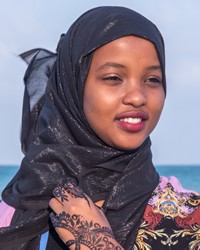Somali in Saudi Arabia

Photo Source:
Copyrighted © 2026
MarosMatousek - Shutterstock All rights reserved. Used with permission |
Send Joshua Project a map of this people group.
|
| People Name: | Somali |
| Country: | Saudi Arabia |
| 10/40 Window: | Yes |
| Population: | 66,000 |
| World Population: | 28,900,200 |
| Primary Language: | Somali |
| Primary Religion: | Islam |
| Christian Adherents: | 0.33 % |
| Evangelicals: | 0.00 % |
| Scripture: | Complete Bible |
| Ministry Resources: | Yes |
| Jesus Film: | Yes |
| Audio Recordings: | Yes |
| People Cluster: | Somali |
| Affinity Bloc: | Horn of Africa Peoples |
| Progress Level: |
|
Introduction / History
Somalis are one of the most homogenous people groups in Africa, speaking a common language, adhering to a single faith, and sharing a cultural heritage. There are four major Somali clan groups. The two largest are the Somaal and the Sab. The Somaal are primarily nomadic shepherds. The Sab usually settle in communities and live as farmers or craftsmen.
Somalis first appeared in Africa around 1200 A.D. and began expanding westward and southward about 150 years later. They converted to Islam around 1550, under the influence of Arab traders that had settled along the coast of present-day Somalia.
Somalia has a climate that varies little throughout the year. With an average rainfall of less than 11 inches, droughts are common. Somali men often leave the women in charge of the herds, so that they might train to become more effective fighters. They are a very individualistic people, sharply divided by clans. Fights often occur between the clans, resulting in tens of thousands of deaths. Their economy is in shambles, and any day people can be killed in this lawless country. For these reasons, Somalis who can, find work in places where there is peace and a workable economy. Saudi Arabia is such a destination.
What Are Their Lives Like?
Somalis in Saudi Arabia are generally in one of two categories. The more fortunate have valuable work skills, so they find employment. Commonly they send money to their families. Some come to Saudi Arabia illegally and take low paying jobs. Saudi authorities periodically conduct raids where they find and deport illegal immigrants from Somalia.
The second kind are refugees. Because of the reasons mentioned above, leaving Somalia is sometimes a matter of life and death. The governments of Saudi Arabia and Somalia are on good terms. Saudis have sent generous relief funds and food to the Somalis. That also means fewer Somalis try to enter Saudi Arabia illegally.
What Are Their Beliefs?
The Somalis are largely Shafiite Muslims, with Sufism (a mystic branch of Islam) being an important religious experience for many.
Somalis frequently turn to the wadaad (a religious expert) for blessings, charms and advice in worldly matters. They believe that many spirits live in the world, and that evil spirits bring sickness by possessing their victims. Some cults have formed in an attempt to appease the evil spirits.
What Are Their Needs?
Somalis in Saudi Arabia need to learn job skills that will attract employers. Christ followers can fill this gap, but it would be very difficult for a number of reasons.
Prayer Points
Ask the Lord to raise up Christian teachers who will work among the Somali and share Christ's love with them.
Pray for effectiveness of the JESUS Film among Somalis in Saudi Arabia.
Ask God to anoint the gospel as it goes forth via radio and television to Somalis.
Ask the Holy Spirit to soften their hearts towards Christians so that they will be receptive to the gospel.